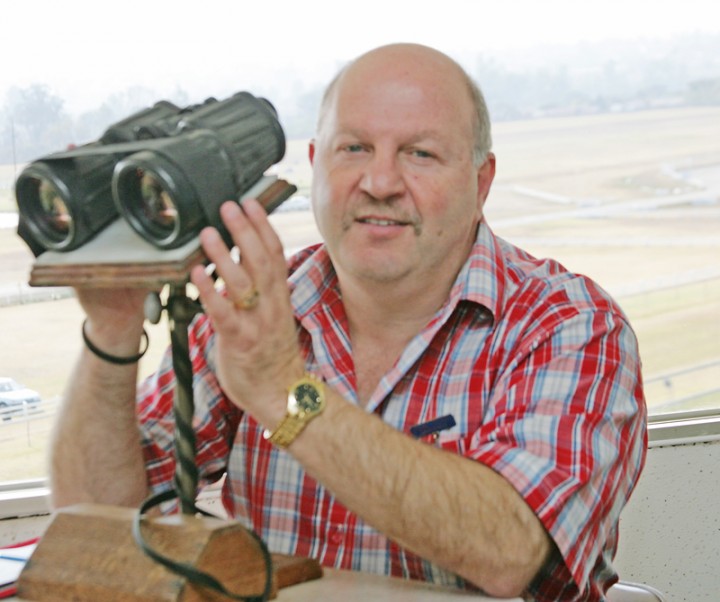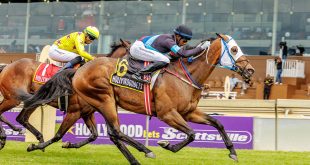Craig “Eagle Eye” Peters proved himself one of the world’s best racing commentators in the 1980s and 1990s and will be calling a record 30th Vodacom Durban July this year.
Efficiency makes a good commentator but “the voice” is what separates the greats from the rest of the pack and in the days when there were no off course visuals Peters’ unique tones and commentary style generated an electrically charged atmosphere into the packed betting rooms. The crowd hung on his every word and those that had, for arguments sake, backed Illustrador, would be hoping to hear his tone reach a crescendo at the 300m mark with the words “BUT ILL-USSS-TRADORRRR!!”. The emphasised pronunciation would immediately be followed by a roar. Peters was rarely wrong when he put his opinion on the line. He was also known for his ability to separate horses in a tight finish and KZN’s on course disseminator, Roy Parker, began calling him “Eagle Eye”.
Craig’s son Sheldon, who became the youngest to call a July in 2002, has followed in his footsteps and non-regular racegoers can hardly tell their voices apart. The pair became the world’s first father-son combination to call a big race simultaneously in 2004, one being the on course commentator and the other for the SABC. Sheldon will be calling his 14th July this year.
July week for a broadcaster is always hectic due to panel discussions and functions, but in his earlier days Craig didn’t mind a late pre-July Friday night, knowing that he would not be able to sleep anyway.
Pouring over the form is also important on the eve of the race. He said, “A commentator needs to be an all rounder. You need to know colours, which horses jump slowly, the betting, the merit ratings, well handicapped and badly handicapped horses, the breeders, owners, trainers and jockeys. Today the eyes of the world are on you before, during and after the race.”
Peters lack of sleep before Julys had no adverse affects. The phone rings off the hook in the commentary box, the day goes by in a “blur”, and the mind is kept alert by the pumping adrenalin.
The nerves settle during the July canter past. It is here that the commentator first feels an indescribable connection to the crowd. With just a slight change of tone, he can spark a huge cheer.
Peters confirmed, “The crowd are with you all the time.”
Peters’ normal pre-race routine is to take note of the colours as the jockeys mount and then, when they canter past, he will call the horse’s name publically once but also many times over in his head. As they are circling at the start he will go through all of the horses over and over again and imagine them in a race situation. Even then there is invariably a voice in the back of the head saying, “Have I done enough homework?”
The commentaries themselves are instinctive and only when listening to the replay will he know what he had said.
No great commentator will ever plan a commentary, but Peters never forgets to mention the sponsors name at the off and provide excitement throughout with his changes in tone and pitch. Being aware of the listeners is paramount and if commentating for TV he will call off the TV, as long as the camerawork is good enough, in order to have the same perspective as the viewer.
He also invariably throws in one or two of the phrases that he has become famous for and which many latter day commentators have copied. He first noticed their impact the day he said spontaneously of the brilliant but ill-fated juvenile Delectable Day “And he’s breathing fire, this one is every inch a racehorse!” Roget’s Thesaurus has helped him compile hundreds of these phrases. Sayings like “And Its tickets and tax!” serve to break the tension for punters and are much appreciated.
Craig regards his first July commentary in 1984, won by Devon Air, as a memorable one, despite his nerves. He remembers emphasising her name as she moved forward and for the same reason he regards Illustrador’s win in 1990 as one of his best July commentaries. He also recalls that in 2000 he correctly called El Picha the winner, despite the judges taking close to ten minutes to announce the result, while in 2008 he didn’t attempt to split the dead-heaters Pocket Power and Dancer’s Daughter.
His least memorable July was 1989, won by Right Prerogative, when heavy overnight rain forced the scrapping of the earlier races. The July was the first race run and the on course atmosphere was affected.
Peters arrived in Durban in 1982 to be assistant commentator to Trevor Denman, having earlier been junior commentator to Peter Duffield and Wolfie and Francois Wolfaardt in Johannesburg. He made his debut as a fifteen-year-old, when becoming the first to broadcast on radio from the old Bloemfontein track. However, he was actually quite an old hand by then. In his primary school days he stood on the bonnet of his father’s car outside the old Newmarket racecourse in Alberton and commentated through his binoculars. As a thirteen-year-old he was granted permission by Turffontein manager Sandy Christie to sit upstairs at Turffontein and commentate into a tape recorder. It was on one such day that he had his best ever lesson, from the great Australian commentator Bill Collins who had come over to commentate on the Holiday Inns, and he still carries the latter’s many points of advice with him today.
Peters’s attitude was influenced by Collins, Trevor Denman and SABC sports presenter Kim Shippey, whom he regards as the most professional of media personalities.
However, he remains humble despite being on the verge of breaking the legendary Ernie Duffield’s record of 29 July commentaries and concludes by saying, “Painting a picture is the most important duty of a commentator. Raising your voice doesn’t mean you have backed the winner, it means you are enthusiastic and love the game.”





